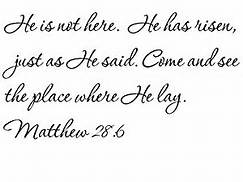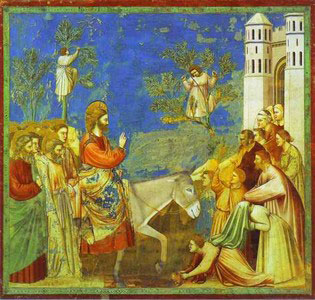John 20:19-31 (20:27) – April 23, 2017

“Don’t Doubt—Believe!”
Being skeptical can be a positive thing. Just think of ice in winter, covering a lake. Am I right in being skeptical that the ice is hard enough to hold me (and my weight)? And, think about engineers and scientists. They are often naturally, honestly skeptical and analytical; they hold things at arms’ length and consider all sides of a situation. That can be positive and helpful, in many situations. Even necessary, at times.
Consider Thomas. He missed the big event, the first time that the resurrected Lord Jesus came back to the rest of the disciples. Let’s look at this event from Thomas’s side. For some reason (we are not told the reason), Thomas missed the weekend gathering of the eleven disciples, plus some others who also were traveling with Jesus. Perhaps they were gathering for regular prayer, or for a worship service. Maybe to have a meal together. Maybe all of the above.
The gathering was secretive. Remember, the Roman and Jewish authorities were disgruntled and angry. The body of Jesus had disappeared completely, even though the tomb had been guarded by Roman soldiers. Therefore, the authorities were looking for a really high-profile body, and it was unbelievable to them that there was no trace of the Rabbi Jesus’s remains, anywhere. Of course the authorities would seek out this upstart Rabbi’s close companions, and keep them under surveillance, just in case any of them knew where the body was.
Whatever the reason, Thomas was not there the previous week. And, he—and the other disciples—had good reason to be jumpy, and cautious. Even, skeptical, as we will see.
Reading from our Gospel passage, “So the other disciples told him, “We have seen the Lord!” But Thomas said to them, “Unless I see the nail marks in his hands and put my finger where the nails were, and put my hand into his side, I will not believe.”
This passage comes to us from the Gospel of John. Throughout John’s Gospel, this writer has an understanding of believing that is active. To John, believing in Jesus is not just an intellectual exercise. No! Belief to John is very much an action verb.
Believing in Jesus is having a relationship with Jesus. As Jesus Himself said earlier in the Gospel of John, “I abide in you and you abide in Me.” So, for this Gospel writer to say that skeptical Thomas was having trouble believing is not quite the same thing as making light of Thomas for doubting. Thomas had just seen his Rabbi and leader die on the cross, be executed by an extreme and cruel form of suffering and agony. I suspect Thomas’s relationship with his Rabbi was pretty close to being extinguished. Sure, Thomas was skeptical.
Are there times when you or I are skeptical, too? I mean, times of sincere questioning of our faith? When we might think, with Elijah, that the heavens are all closed up, and nothing can penetrate, not even a desperate prayer? If we were honest with ourselves, I suspect in almost every person’s life there are difficult times, challenging times, times when we come to the end of ourselves and have no more hope, no more tears, no more swear words to say.
Desperate times, indeed. Who can blame Thomas for being skeptical? As Father Rick mentioned on a sermon preparation site I follow, how crushed Thomas must have been. Perhaps, to keep his heart safe, he refuses to believe… it hurts too much to believe. [1] Can you hear pain, and fear, and maybe stubbornness in his response?
Here is a slightly different translation of Thomas’s dramatic statement: “Unless I see the mark of the nails in his hands and shove my finger into the mark of the nails, and shove my hand into his side, I absolutely will not believe” (20:25, translation by Jaime Clark-Soles). Here, we look at the verb from a slightly different angle. The Greek verb ‘believe’ is a forceful one (ballo), as is the emphatic negative (ou me). “I absolutely will not believe.” Not a simple, “I’ll believe it when I see it” —Thomas has a lot of conditions;” [2] conditions that he speaks out of a dark place of anger and grief and anxiety, and conditions that will only be met by the resurrected Jesus.
But, what happens next?
Now, this is not resolved right away. Thomas is left doubting—rather, being skeptical, for a week. Reading from our Gospel passage: “A week later his disciples were in the house again, and Thomas was with them. Though the doors were locked, Jesus came and stood among them and said, “Peace be with you!”
What would that do to your faith? If your faith were wavering, and you were faint of heart, perhaps doubting, maybe even skeptical—what would we do if Jesus were to come among us today—right there—and say, “Peace be with you!” Would that cause people to believe in Jesus? Let’s find out.
“Then Jesus said to Thomas, “Put your finger here; see my hands. Reach out your hand and put it into my side. Stop doubting and believe.”
If Jesus appeared among us and said those things to us, would that cause you and me to have the kind of belief that John is talking about here—where we start or cement a deep, true relationship with our Lord and Savior Jesus, and believe in our hearts that God has raised Him from the dead? What did those words do for Thomas?
28 Thomas said to Jesus, “My Lord and my God!”
Did you hear? Thomas just made an earthshaking confession of faith as well as a crystal clear statement of belief.
(And, remember, we are using John’s definition of belief. A deep, true relationship with our Lord and Savior Jesus!) Praise God, this is a confession that Jesus is our Lord, He is our God. As John tells us in the beginning of his Gospel, He is the Word made flesh, come into this world to make His dwelling among us. To abide in us as we abide in Him. All this Thomas confesses in this statement of faith. This confession is made all the more powerful because skeptical, discouraged, frightened Thomas has made it.
I ask all of us, again. What would we do if Jesus were to come among us today—right there—and say, “Peace be with you!” What would we do if Jesus showed us the nail scars and where the spear went into His side? Oh, no! some might say. Jesus would never do that. Not here, not now. Perhaps in bible times, but not today.
Here we have a clear invitation to the skeptics, to the doubters, to those who are not sure about their faith any longer. This Gospel reading is also for those who have been hurt by the church, and perhaps are not sure there is Anyone up there listening to them any longer. This passage is for you, too.
Praise God, Jesus has conquered death, and He will be with us when we walk through fiery trials and dark places in our lives. Using John’s definition of belief, we all can have a true, deep relationship with Jesus as our Lord and our God, just like Thomas.
Have you heard? Do you know that Jesus has risen from the dead? This is not only Good News, it’s the best news ever shared, in the history of ever. It is much more than just the dry words from the Apostles Creed, written on a page. Jesus holds out His hands, shows us His side. Christ is risen, indeed!
[1] http://desperatepreacher.com//bodyii.htm Posted by Rick+ in Reno, March 31, 2016.
[2] http://www.workingpreacher.org/preaching.aspx?commentary_id=3222 Jaime Clark-Soles
(Suggestion: visit me at my regular blog for 2017: matterofprayer: A Year of Everyday Prayers. #PursuePEACE – and my other blog, A Year of Being Kind . Thanks!)



